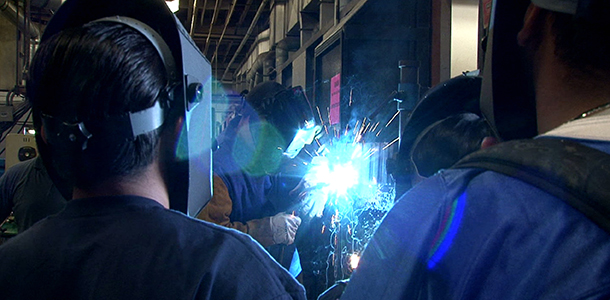
(Photo Credit: John Guenther/CA Fwd)
One year after several California Economic Summit leaders joined the 2015 Strong Workforce Task Force, a statewide effort led by the community college chancellor’s office to improve California’s workforce training programs, the Summit is working to ensure the first of the Task Force’s 25 recommendations are adopted in this year’s state budget and related legislation.
The Summit outlined its top priorities this month in letters to the Senate and Assembly budget subcommittees signed by two dozen members of the Summit’s Workforce and Advancing Manufacturing Teams. The letters detail the Summit’s support for three budget proposals—a $200 million investment in a new Strong Workforce Program, a $48 million commitment to the Career Technical Education Pathways Program, and a $25 million investment in the Awards for Innovation in Higher Education—as well as several bills that would direct more financial aid to career tech ed students (AB 1892, Medina) and improve how schools measure student employment outcomes (SB 66, Leyva).
Summit leaders have been invited to testify in budget committee hearings in March and April, where they will encourage lawmakers to make these investments in career technical education—and, just as important, allocate these funds across regional economies and industry clusters, instead of diffusing them among all community colleges.
“The Summit’s goal for the last three years has been to find new ways to close California’s growing skills gap, the projected shortage of more than one million skilled workers we’re facing over the next ten years,” says Alma Salazar, vice president of education and workforce development at the Los Angeles Area Chamber of Commerce and co-lead of the Summit Workforce Action Team. “To meet this challenge, we need to find ways to provide more people with the skills they need to earn well-paying jobs in fields from health care to manufacturing. This means supporting proven programs in career technical education and doing everything we can to promote more effective collaboration between employers and the vast networks of workforce training programs we have in every region.”
The Summit’s 2016 Roadmap to Shared Prosperity offers a detailed plan for accomplishing these goals, both by implementing the Workforce Task Force recommendations and by supporting the formation of regional civic organizations that can begin the complicated, necessary work of aligning regional workforce training systems, from K-12 schools and community colleges to workforce investment boards and community-based organizations.
“We’ve seen the community college system taking the lead on retooling workforce training systems over the last several years—establishing new approaches to regional coordination that will allow regions to tailor programs to local economic needs, streamline curriculum approvals, and direct funding where it can have the most impact,” says Chris Harrington, former vice president of strategy for Toshiba and co-lead of the Summit Advancing Manufacturing Action Team. “The Summit can play a vital role by ensuring industry is engaged early and often to make sure these courses—and the skills they’re providing students—are relevant to local employers.”
The proposed 2016-17 state budget, which will be approved later this summer, currently includes several investments in career technical education programs that the Summit has highlighted as critically important.
A new Strong Workforce Program proposed by the governor would provide community colleges with $200 million annually to expand access to career technical education courses and programs, while evolving regional coordination as recommended by the Task Force. This program will be strengthened by the budget’s proposed $48 million investment in the Career Technical Education Pathways Program, an existing effort to increase collaboration between K-12 schools and community colleges. The Summit supported the pathways program when it was first created in 2012 and supports the budget proposal to make it permanent.
The Summit is also pushing lawmakers to consider two bills that can reinforce efforts to retool the workforce training system: AB 1892 (Medina) would restructure the financial aid system for vocational education, expanding grants to career technical education programs meeting high employer needs and (in its current form) setting the total possible Cal Grant C award at $3,000. SB 66 (Leyva) would implement Task Force recommendations on improving how program performance is tracked, requiring data to be collected on student employment outcomes and better aligning the performance metrics used by state and federal workforce programs.
“These changes will help create a better environment for workforce training in California, and they will lay a foundation for the collaborative approach we know is the key to meeting our state’s daunting workforce challenges,” says Salazar. “The Summit network will continue to push for these proposals to be adopted, while also working with regions to ensure they can produce a generation of workers with the skills they need to thrive in the years ahead.”
The California Economic Summit is a collaboration of California Forward and the California Stewardship Network designed to advance the triple bottom line of a prosperous economy, a sustainable environment and community equity.

